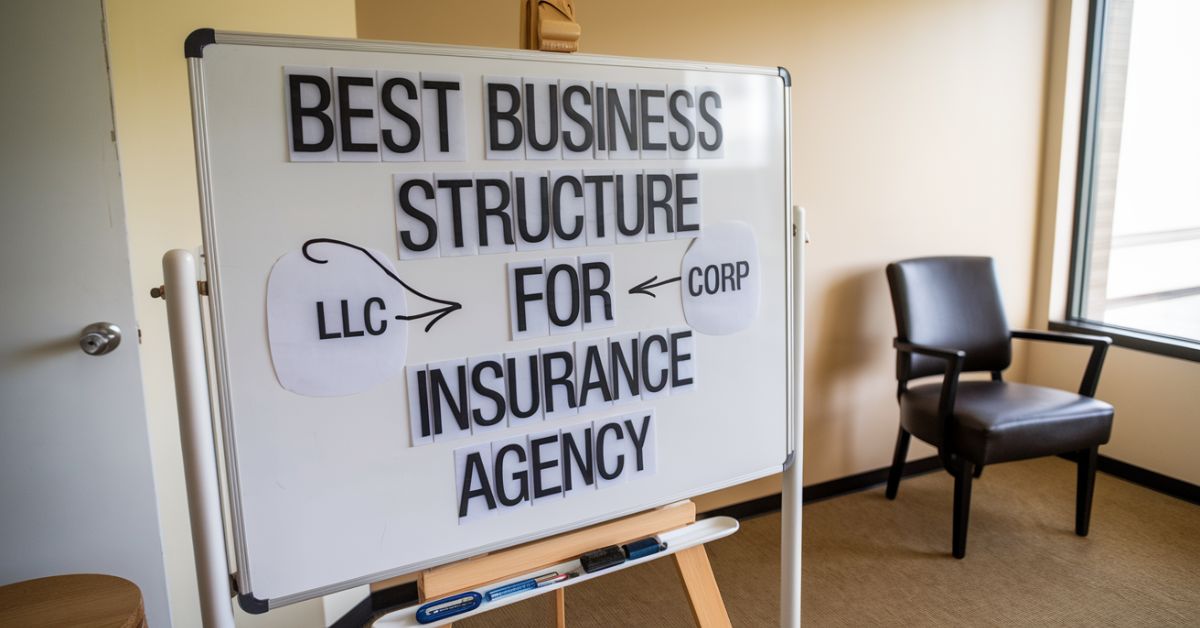Best Business Structure for an Insurance Agency: A Guide for Entrepreneurs in America
Best Business Structure For Insurance Agency Starting an insurance agency is an exciting venture, but one of the first and most important decisions you’ll need to make is choosing the right business structure. This decision can impact everything from your legal protection and costs to how you foster your business. In this article, we will discuss the best business structures for a security office and how to pick the one that suits your prerequisites.
1. Sole Proprietorship
Best Business Structure For Insurance Agency A sole proprietorship is the least demanding and most ordinary business structure, especially for free endeavors. It infers you, as the owner, are the business, and there’s no legitimate capability among individual and business assets.
Pros:
- Easy to set up.
- Negligible cost.
- Limitless power over business decisions.
Cons:
- Boundless individual obligation, meaning your own assets (home, venture reserves) could be in peril if the business is sued.
- Harder to raise capital or create.
When to choose this structure: In case you are starting nearly nothing, with just yourself as the trained professional, and you’re not worried about liability bets, a sole possession can be a respectable early phase.
2. Partnership
An affiliation resembles a sole possession, but it influences no less than two people. In a general association, all assistants share in the advantages, disasters, and the leading group of the business.
Pros:
- Easy to shape.
- Split risk between accessories.
- Benefits go directly to the accessories, avoiding corporate costs.
Cons:
- Boundless individual commitment for all accessories, meaning every accessory can be anticipated to assume a sense of ownership with business commitments.
- Potential for conflicts between assistants.
When to choose this structure: If you’re starting an insurance association with an accepted partner, this might be a nice decision. In any case, know about the singular obligation.
3. Limited Liability Company (LLC)
Best Business Structure For Insurance Agency A limited gamble association (LLC) is one of the most notable choices for security associations in the U.S. It solidifies the ease of a sole possession or association with the gamble protection of a venture.
Pros:
- Confined individual commitment, protecting your own assets.
- Flexibility in how the business is troubled (can choose to be troubled as a sole proprietorship, affiliation, or venture).
- More straightforward to regulate than an association.
Cons:
- More work area work and higher charges than a sole proprietorship or affiliation.
- Ought to concur with state-express rules and charges.
When to choose this structure: In case you’re stressed over confidential obligation anyway need versatility and straightforwardness, a LLC is a mind boggling decision for most security associations.
4. Corporation (C-Corp or S-Corp)
Best Business Structure For Insurance Agency An organization is a more multifaceted business structure that gives the most protection from individual commitment. There are two sorts of endeavors appropriate to insurance associations: C-Corp and S-Corp.
C-Corp:
- The association is troubled freely from its owners (twofold duty appraisal).
- Boundless improvement potential with the ability to sell stock.
- More customary development, with an overseeing body and financial backers.
S-Corp:
- Go through charge assortment, importance pay is troubled only a solitary time at the financial backer level (like a LLC).
- Limited to 100 financial backers.
- No twofold expense evaluation like a C-Corp.
Pros of both C-Corp and S-Corp:
- Most grounded individual obligation security.
- Easier to raise funds through selling shares.
Cons:
- More exorbitant to set up and stay aware of.
- Complex rules and record-keeping requirements.
When to choose this structure: If you mean to foster your security office in a general sense, enlist delegates, or raise resources from monetary patrons, an organization may be the best choice. S-Corps are more fitting for little to medium-sized associations, while C-Corps are better for greater associations with plans to expand rapidly.
Which Business Structure Is Best for You?
Best Business Structure For Insurance Agency While choosing the best business structure for your assurance association, ponder these factors:
- Liability protection: If defending your own assets is a first concern, ponder a LLC, S-Corp, or C-Corp.
- Charges: A LLC or S-Corp could help you with avoiding twofold expense evaluation, which is a huge burden of a C-Corp.
- Cost and multifaceted nature: Sole proprietorships and affiliations are the most direct and generally reasonable to set up yet offer no confidential gamble confirmation.
- Improvement potential: If you expect to foster your office, take on laborers, or attract monetary patrons, an association (S-Corp or C-Corp) may be the best choice.
Final Thoughts
Best Business Structure For Insurance Agency Picking the best business structure for your security office is an essential decision that will impact your real protections, charge responsibilities, and improvement potential. For a little to medium-sized assurance workplaces, a LLC or S-Corp discovers some sort of concordance between ease, tax reductions, and obligation protection. Regardless, if you desire to grow rapidly or need to raise capital, outlining a C-Corp could give the plan expected to expansion.
Best Business Structure For Insurance Agency Preceding chasing after your last decision, talk with a business legal counselor or clerk who has some mastery in security workplaces to ensure you’re picking the right plan for your specific goals and prerequisites.
Also Check: How to Choose the Best Business Insurance in the USA
Follow us: Facebook


Leave a Reply